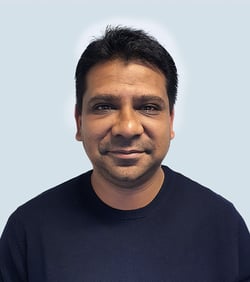 Shushant Jain, PhD
Shushant Jain, PhD
Director of Discovery Technology
Expert Profile
Shushant Jain, PhD, is a molecular and cellular neurobiologist who directs Ncardia’s drug discovery team, helping in vitro phenotypic assays in representative model systems to improve the translation of therapeutic strategies. He brings a rich diversity of expertise to his role, having led extensive, multiyear research programs to aid several drug discovery initiatives, spanning numerous therapeutic areas using automation and high-content methodologies. Shushant’s research has been published in Neuron, Genome Biology, the Journal of Biomolecular Screening and the Journal of Biological Chemistry, among others.
Insights
Continual advances in complex disease modeling provide drug developers with the potential for greater speed and long-term cost savings in the development of effective therapeutics. This interview with Shushant sheds light on some of the innovations and perceptual shifts that spark his optimism in drug discovery.
“Among all contributors to neurodegenerative drug discovery – from academic researchers to small, medium and large pharmaceutical companies – we’re seeing increasing levels of activity. Drug developers are becoming better able to understand and tackle the challenges inherent in developing effective therapeutics. As a community, we are digging more deeply than ever into the biology and mechanisms of disease states. Leading-edge discovery is beginning to focus less narrowly on researching one or two specific genetic targets but rather on understanding more broadly the complex biology, phenotypes and mechanisms that shape disease onset and progression.”
It’s no secret that neurodegenerative drug discovery has yielded disappointing results in terms of delivering a range of effective therapeutic treatments to patients. To a significant extent, this is the result of both traditional research approaches to drug discovery and development and misperceptions about innovations in gene-based – especially iPSC-based – approaches. Shushant sees perceptions shifting within the industry and among regulators – shifts which place neurodegenerative drug discovery on the cusp of real change.
“Many researchers believe that gene- or iPSC-based drug discovery is too complex, time-consuming or costly to implement. But we are consistently demonstrating that the opposite is true. Reliance on animal modeling, for example, or non-relevant stem cell samples leads far too often to failures in clinical trials – failures that can be avoided though the complex modeling systems that are available from companies like Ncardia. We can provide cell samples that correspond to the age of patients with diseases that occur in older populations. Working with precisely modeled cells enables drug developers to enter clinical trials with far greater confidence in their success than by following traditional approaches.”
As pharmaceutical companies look to bring effective therapeutics to market more reliably, rapidly and cost-effectively, they are increasingly turning to the potential of innovations in novel therapeutic modalities. Those not willing or able to invest the time and financial resources into developing in-house capabilities can fast-track projects by collaborating with teams of experts that have already created effective approaches to the complex research challenges they face. Shushant sees many reasons for hope and optimism in neurodegenerative drug discovery not years in the future, but today.
Hear more from Shushant and other panelists at our last roundtable, “Science, Innovation and Hope: How to advance drug discovery for neurodegenerative diseases.” View here.
Or, if you’ve got a near-term iPSC drug discovery project that might benefit from insights from Shushant and the rest of our team, click here. We’ll get in touch to discuss the challenges and opportunities you face in neurodegenerative drug discovery, with an eye toward developing a solution tailored to your needs.
